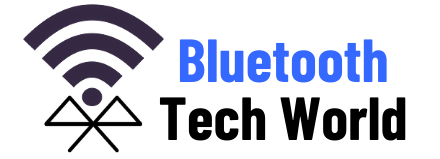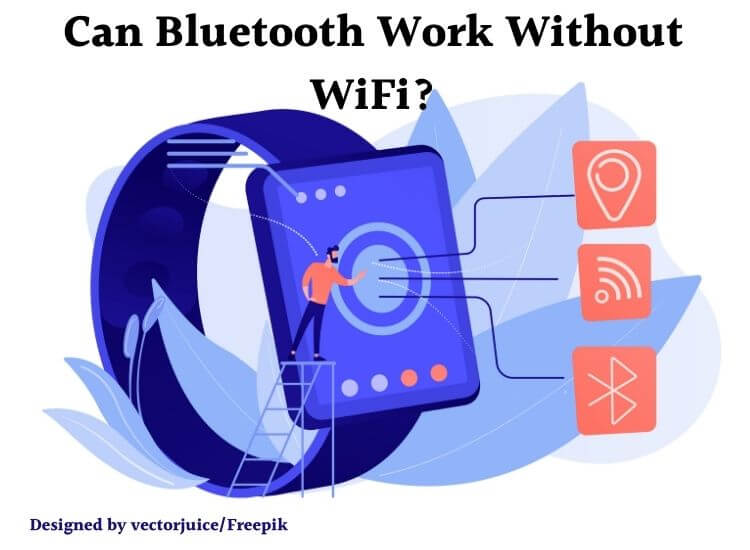It’s tricky to be caught in a mental debate about whether Bluetooth can work without WiFi or not considering the fact that both are wireless technologies if you don’t understand how each works.
Bluetooth devices can work without WiFi. In fact, you don’t need WiFi to use Bluetooth features on any supported device like headphones, earbuds, printers, speakers, and so on. That’s how the technology has been from its inception; nothing has changed.
However, WiFi can interfere with Bluetooth, which is different from one needing another for it to work. Also, there are cases where Bluetooth and WiFi can act typically like each other. Some people get confused with this, and I hope you’re not one of them :). I’ll address those instances shortly in this post.
To put things into the right perspective, let’s take it from how both technologies work and their similarities.
What Is Bluetooth and How Does It Work?
 Bluetooth is a wireless communication technology that is used mostly to transfer data over short distances, typically 10 m using industrial, scientific, and medical (ISM) radio waves. It operates in radio bands from 2.402 GHz to 2.480 GHz.
Bluetooth is a wireless communication technology that is used mostly to transfer data over short distances, typically 10 m using industrial, scientific, and medical (ISM) radio waves. It operates in radio bands from 2.402 GHz to 2.480 GHz.
While it’s popularly misconceived to be effective only within 10 m, it’s possible to be used within 100 m and even up to a mile. However, this is uncommon to find in consumer devices as the range is decided by manufacturers.
Before the era of Bluetooth, electronic devices were connected with cables; some still do. For instance, your mouse, speaker, and keyboard could only work through a cable connection with your computer.
As a device-to-device technology, Bluetooth replaces these cables by serving as the means of connectivity between the devices. Just as you don’t need the cables to access WiFi or the internet to connect with those devices, so should you see Bluetooth.
Also, the cables that connect the mouse, keyboard, and speaker to your desktop computer have been designed with a specific length. That’s not different from Bluetooth. Every Bluetooth device has a range, that is, the distance over which you can use it.
How Does WiFi Work?
 WiFi is similar to Bluetooth in that they’re all wireless technology and work in the same radio band. However, WiFi works differently from Bluetooth. None of them needs the other in order to work.
WiFi is similar to Bluetooth in that they’re all wireless technology and work in the same radio band. However, WiFi works differently from Bluetooth. None of them needs the other in order to work.
Although there are cases where you’ll see that one appears to function as the other, which I will cover shortly.
WiFi, a short form of Wireless Fidelity, works primarily by connecting one or several devices to the internet in a local area network. It covers a relatively long range, and you can use it to transfer enormous amounts of data between devices compared to Bluetooth.
A common scenario you may know is a local area network (LAN) connection. Typically, you need a LAN cable to be able to connect devices to exchange information. Like Bluetooth, WiFi comes to play by having a router that connects to the LAN and broadcasts the signal as radio waves.
In this case, you don’t need any cable again. All you have to do is tap into the radio signal, which usually requires a password if it’s private. This gives you wireless data communication access; that’s why you can surf the internet, send emails, stream online and even make calls.
Why Bluetooth Works Without WiFi?
 The purpose of Bluetooth is to eliminate cabling in various portable equipment by being a medium for connectivity. And that works without you needing any local area network access. It gives you a direct connection between devices by “pairing,” and its work is done.
The purpose of Bluetooth is to eliminate cabling in various portable equipment by being a medium for connectivity. And that works without you needing any local area network access. It gives you a direct connection between devices by “pairing,” and its work is done.
On the other hand, WiFi is a replacement for highway data cabling, which you need to access a local area network in your house or office. Without WiFi getting you access, you can’t go online to use the internet.
An illustrative example of their different working scenarios is how I use my smartphone with a Bluetooth speaker. When playing audiobooks of the Bible, I relay the sound through a Bluetooth connection to output it into the speaker. But first, I have to pair it with the speaker, and none of the devices uses WiFi.
While connected to the speaker, I sometimes watch YouTube videos but not until I’ve turned my WiFi receiver on. In this case, my phone needs the internet to be able to play the videos but not the Bluetooth speaker.
Other scenarios of Bluetooth usage you can think of are wireless mice and keyboards for connecting to your computer for information flow, Bluetooth headsets for making phone calls, Bluetooth printers that you can connect to other Bluetooth devices to receive commands for printing, and many more.
These devices have Bluetooth transmitters or receivers installed, allowing for pairing rather than surfing the internet. As I stated earlier, you can typically use Bluetooth and WiFi as the other.
Where Bluetooth and WiFi Appear Typical of the Other
You can use Bluetooth to share internet access with another device as much as you can also connect two devices with WiFi. For example, you can tether your mobile internet with your laptop if it lacks an internet connection to go online.
You simply have to pair the Bluetooth devices and use Bluetooth tethering on your mobile phone to share your internet with the laptop. In this case, we can say that your laptop needs the help of Bluetooth to get internet access. However, it doesn’t use the Bluetooth signal to access the internet.
WiFi can also act like Bluetooth, particularly in sharing files over a short distance. Mobile phones can connect with each other through WiFi direct to share files. Also, you can use WiFi to share data among devices connected to the same local area network.
What you have to understand clearly is that Bluetooth replaces cabling in the connectivity of devices and sharing of files over a short range while WiFi is the medium of exchanging information over the internet in a much greater range without the use of LAN cables.
Conclusion
In short, Bluetooth doesn’t need WiFi to work. There’s no dependency between these technologies even right from their inception. Bluetooth is solely to provide connectivity between devices without needing cables and also to share files over a short distance.
It can also act like WiFi with the Bluetooth tethering feature, but they’re not the same. Likewise, WiFi but it’s not a requirement for Bluetooth to work.
There may be some cases where a device with both WiFi and Bluetooth may need internet access for it to work. In that case, it’s not a Bluetooth requirement but that device.
Hope this article has been helpful to you. If you have further questions or anything to share, please drop it in the comment. Thanks


Thanks for this information explaining the differences and similarities between Bluetooth and WiFi. I thought I knew the difference, but your post clearly showed the distinction.
I have used the hot spot on my phone to be able to use my computer where there is no WiFi connection and that has been really handy. Not as fast as a WiFi connection, but decent.
I think you explained very well how these two technologies work. Glad I found this article in my search for explanations of these techs!
Hello Karin,
Thanks for stopping by and I’m you’ve gotten something from the article.
Thank you for this explanation about wifi and bluetooth. I use both of them and for different reasons. My phone and computer connect to our internet via wifi. I don’t really use bluetooth much anymore but there was a stage I would use my bluetooth to send files from my phone to my husband’s device. I can’t remember the last time I used bluetooth.
You’re always welcome to my website, Lynne
Thanks for this….so if I want to use a tv screen on a rolling stand (to teach a class), could I pair the smart tv screen and my laptop via Bluetooth, in a room where there is no internet connection? And then I could sit behind my students on my laptop, them watching the tv screen paired via Bluetooth to my laptop, with neither tv screen nor laptop connected to any internet?
Ah, thanks in advance if you answer this!
Hi Denise,
Unfortunately, Bluetooth is not optimized to help you with this task. Without the internet, you can use an HDMI cable to mirror your laptop screen to the tv. Other than that, you can use hotspots to from your mobile phone to your laptop and then hotspot your laptop’s connection so that you can connect your tv to that network for screen mirroring.
I hope it helps. Hopefully Bluetooth will strengthen it functionality to accomplish that in the near future.
I need to to thank you for this very good read!! I certainly loved every little bit of it.
I have you bookmarked to look at new stuff you post…
You’re welcome!